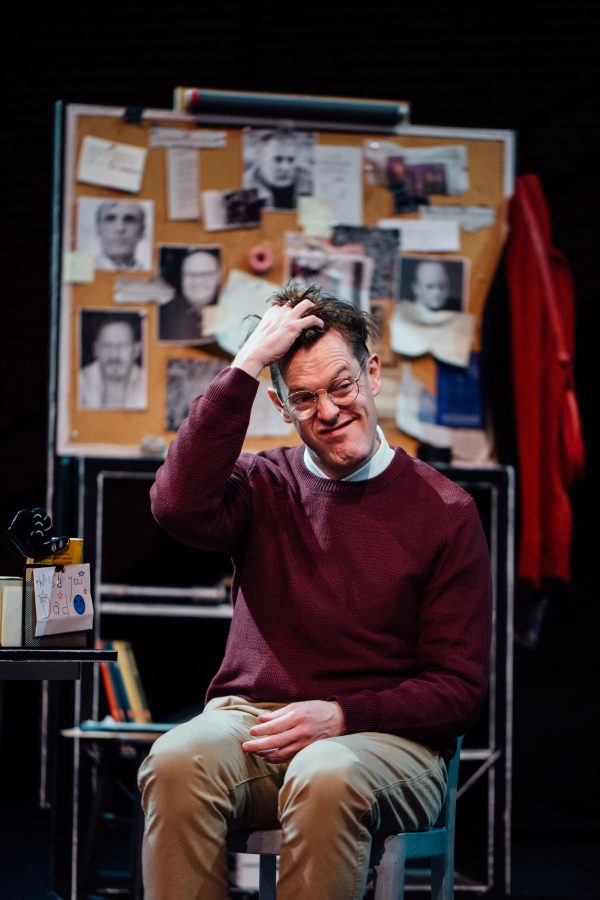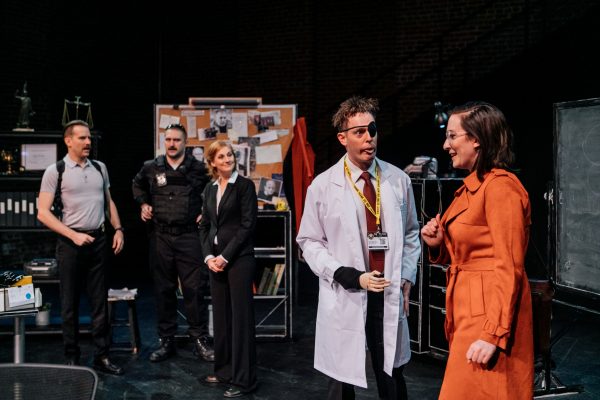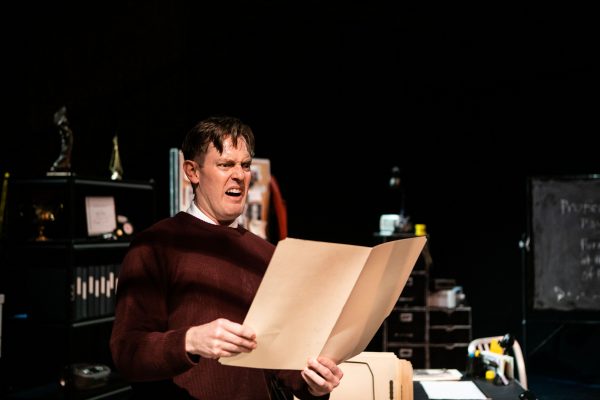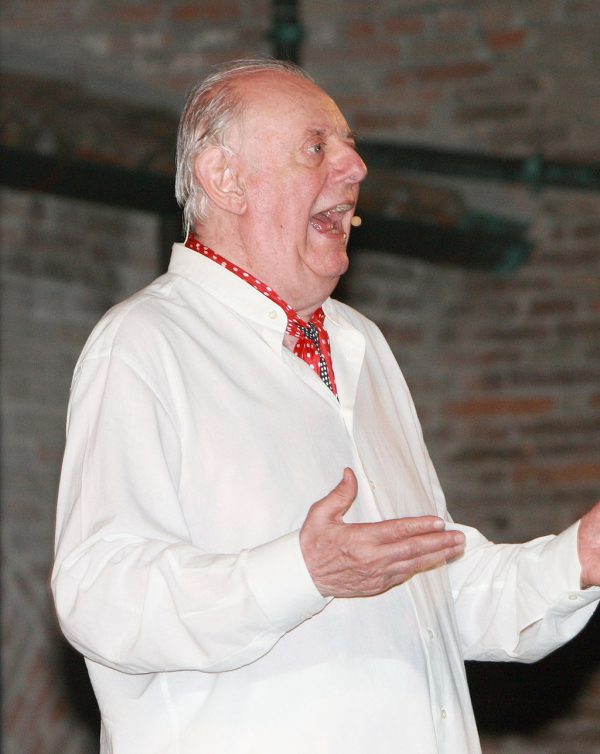There are many way of looking at a writer’s lifelong accomplishments, but few have been as brazen, political and uninhibited as the baldly anti-fascist plays of Dario Fo. Fo, who died in 2016, was a satirist, a modern-day Molière, an exuberant and prolific peasant-clown. In partnership with his wife, the equally engaged writer/performer Franca Rame, Fo put his outlandish comedic excesses in the service of slapping down hypocrisy wherever he found it—especially politics, where it is always abundant.
A defining feature of Fo’s plays is their malleability. He was always open to actors improvising, and the general seat-of-the-pants nature of his work lent itself comfortably to that. The looseness also allows the plays to survive their age and changing tastes and styles, because you can bend them in any way you wish and usually get the best results when you do.

Bob Turton in Dario Fo’s The Accidental Death of an Anarchist at The Actors’ Gang.
Case in point: The Actors’ Gang current production of Fo’s The Accidental Death of an Anarchist. Even when it was new this play was a bit creaky because of its parochial roots and a kind of anything-goes approach. But the lively (and mercifully speakable) translation by John Laskin and Michael Aquilante used by the Actors’ Gang makes plenty of room for the talented actors to add their own flourishes, with limits presumably being set by the director, a vigilant Will Thomas McFadden.
Whatever the methods employed, they completely revitalize the play.
Fo was fearless. Aside from being a man of the people, he was an instinctive revolutionary and an artist of all trades. He claimed to have been influenced by Brecht and Bekett, Chekov, Shaw and the eminent Milanese director Giorgio Strehler among others. His family connections to theatre and writing included a sister who was a writer; a mother who wrote a memoir; a younger brother who became a theatre administrator, while his father, who made his living as a railroad stationmaster, also was an amateur actor. So writing, performing, rebelling, singing, songwriting, directing, designing and acting were in the blood. The story-telling, he alleged, came mostly from a maternal grandfather and from the fishermen and glassblowers of Lombardy among whom he had lived for a time.

l-r, Adam J. Jefferis, Tom Szymanski, Guebri Vanover, Bob Turton & Julia Finch in Dario Fo’s The Accidental Death of an Anarchist at The Actors’ Gang.
One of the primary changes in this version of Accidental Anarchist—and, oh, how Fo would have approved—is the switching of the locale from Italy to the present-day U.S.
The plot of Accidental Death is basic comedy: an anarchist accused of bombing a railway station has fallen to his death from a third story window at police headquarters and, of course, the police is quick to claim it was a suicide.
However, an intruder described to us only as a Maniac (or Madman or whatever else) invades police headquarters and through ruse and rowdiness, deceit, disguise and diversionary tactics manages to incite complete pandemonium, punching holes into what were already paper-thin tall tales from the police about the incident.
One by one, they fumble, from the Police Chief (Guebri Vanover at this performance) to the two captains (Ethan Corn and Adam J Jefferis), to the lowly Officer guarding the entrance (Tom Szymanski). The more they try to intimidate him with their inflated self-importance, the more the Maniac (the exceptional Bob Turton) makes confetti out of their “reports,” until they become more confused by their own fabricated versions of what happened than by the Maniac’s counterpunch.

Bob Turton in Dario Fo’s The Accidental Death of an Anarchist at The Actors’ Gang.
By the time a dreaded journalist (Julia Finch) comes calling with a few questions of her own, full-blown panic sets in. The cops are basket cases, and the comedy swerves steeply—and deliriously—off the rails.
Appropriately, Margaret Cleary’s setting, Tess Vidal’s costumes, and Bosco Flanagan’s lighting are kept simple and serviceable. Even the props are elementary enough to serve the rampant excesses of the comedy, making sure we understand that this is not about realism and never was meant to be.
Were it not for Turton’s exceptional performance as the Maniac—a clown in the order of Buster Keaton or Red Skelton or an improbable fusion of the two—this version of the play, with its unrestrained attacks on the current leadership in Washington, might not have escaped condemnation as simply too broad. But caricature is embedded in Fo’s signature style. The production’s shenanigans almost completely re-animate the challenges of this play. The second half could probably have used some selective trimming, but on the whole this is a stimulating and at times exhilarating production.
Aside from the sheer plasticity of Turton’s comic genius and his boundless energy, he gets terrific support from unexpected sources: Szymanski’s Officer Dudak, reveals himself to be a rock musician manqué, whose inadvertent little outbursts of song he quickly quashes in a confusion of faltering shyness—while the physical message we get from Jefferis’ Captain Adler is that he secretly wishes he had been born not just a woman but an oh-so-delicate ballerina.

The late Dario Fo, author of The Accidental Death of an Anarchist at The Actors’ Gang.
The welter of propulsive hysteria loses some of its steam as it reaches for its raucous choice of endings (we are offered two). But small matter. This remains by far the most effective and enjoyable production of an arresting (pun intended) and challenging comedy.
Final words, not often spoken here: do not miss it.
A Dario Fo – Ralph Steadman exhibition will be on view throughout the run of Accidental Death of an Anarchist. The exhibition features six Dario Fo artworks, including an original painting Fo did inspired by the Actors’ Gang production of A Midsummer Night’s Dream directed by Tim Robbins. The exhibit is open to theater patrons an hour prior to performance.
Top image: The cast of The Accidental Death of an Anarchist at The Actor’s Gang.
Photos by Ashley Randall
WHAT: The Accidental Death of an Anarchist
WHERE: The Actors’ Gang, 9070 Venice Blvd | Culver City, CA 90232
WHEN: Thursday-Saturdays, 8pm. Sundays Feb 17, 24 & March 3 only, 2pm. Ends March 9.
HOW: Tickets, $34.99. Seniors, $30. Under 30 and full-time students, $25. Closing Night Tickets only, $34.99-$50.Thursdays, “Pay What You Can.” All tickets are available online at www.TheActorsGang.comor by phone at 310-838-4264.
RALPH STEADMAN EXHIBITION: Dario Fo – opens one hour before curtain.